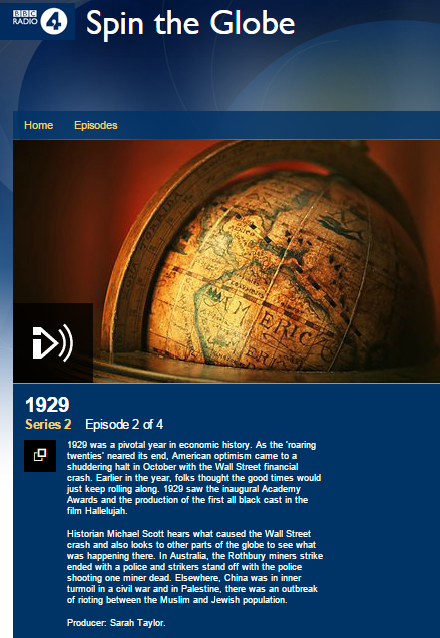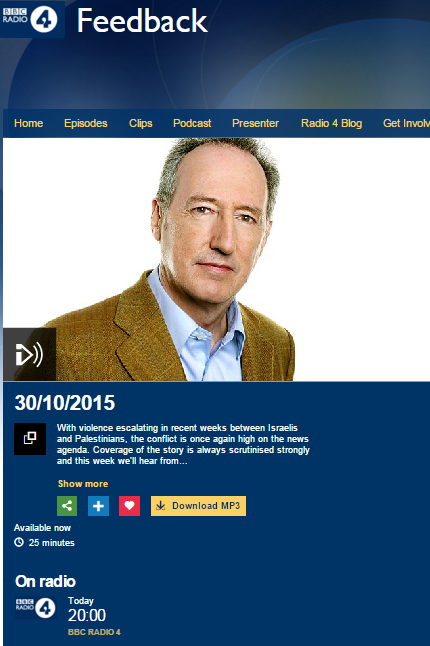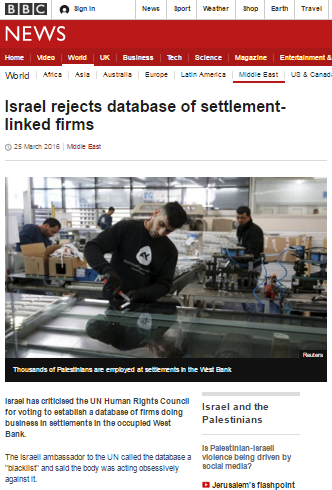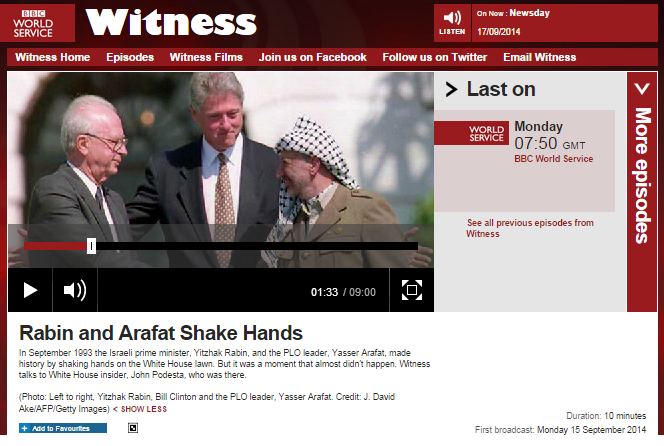The November 18th edition of the BBC Radio 4 history programme ‘Spin the Globe’ focused on the year 1929, with part of the broadcast – presented by historian Michael Scott – relating to that year’s Arab riots in what was then mandate Palestine. The programme’s synopsis states:
“…in Palestine, there was an outbreak of rioting between the Muslim and Jewish population.”
The relevant segment can be found from 14:40 here.
Scott’s introduction to the item misleadingly leads listeners to believe that efforts to establish a Palestinian state were underway in 1929.
“…in Palestine, 1929 was the year in which the ongoing dispute over the establishment of a Jewish and Palestinian state escalated to new heights of conflict, as Dr Eugene Rogan of Oxford University explains.”
Rogan: “Well the events of 1929 really demonstrated the way in which religion could come to take nationalist overtones. If you look at the origins of the massacres that took place in both Jerusalem and Hebron in 1929, we have to go back to a series of seemingly benign incidents that took place in the summer of 1928 when Jewish worshippers raised a screen to separate male and female worshippers at the side of the Western – or Wailing – Wall. This was for Jewish worshippers a way to create a more conducive environment for men and women to come together to pray. But for Arab onlookers it seemed as though the Jews were trying to create an open-air synagogue at the Western Wall that they feared could be a prelude to claiming the Western Wall as a sort of privileged area for the Jews. It is a retaining wall of the Haram complex – the area of great religious importance to Muslims in Jerusalem. The Dome of the Rock and the Aqsa Mosque are both part of this Haram complex that overlooks the Western Wall so whatever happens to the Western Wall really proved to be a flash point to Muslim sensitivities as well.”
Notably, no effort is made to inform listeners of the very relevant issue of the significance of the Western Wall to Jews or of the fact that the Haram complex is also called Temple Mount – the holiest site in Judaism – or why that site is so important to Jewish culture and religion. The BBC’s style guide, however, clearly instructs that both terms should be used.
“Temple Mount – both words capped. Note that the area in Jerusalem that translates from Hebrew as the Temple Mount should also be described, though not necessarily in the first four pars, as known to Muslims as the Haram al-Sharif (ie lower case ‘al’, followed by a hyphen – and never ‘the al-Haram al-Sharif’, which is tautological). The Arabic translates as the Noble Sanctuary.”
Rogan continues:
“And here I think British handling of the Jewish screen at the Western Wall was very clumsy. The British responded with much too much force, created tensions in the Jewish community, provoked an Arab hostility that then led to fights and really between 1928 and 1929 a deepening of tensions between Muslims and Jews over religious sites of importance to both communities. And they blow up in the summer of 1929 when those tensions go from being a matter of fist fights to becoming really massacres.”
Scott: “Around 130 Jews and 115 Arabs lost their lives in a week of fighting in several cities across Palestine with many more people injured. But there were some stories of individual kindness that provided a relief from the bloodshed.”
In fact – contrary to the impression of equivalence created by Scott – most of the Arab dead were killed by British police trying to stop the attacks rather than in “fighting” between Jews and Arabs.
The item then returns to Eugene Rogan, who revealingly describes Hebron’s Arab community as “indigenous” whilst the Sephardi Jewish families who had lived there for centuries are afforded no such title.
Rogan: “It is in Hebron where I think the indigenous Arab community’s response was most humanitarian. The total population of Hebron was about twenty thousand in 1929 and of that between 600 and 800 Jews lived among a majority Arab Muslim population. In the riots of the 24th of August there were about 67 Jews that were murdered by the mob. But the striking thing was 435 Jewish residents of Hebron were actually sheltered by their Arab neighbours. So some two-thirds of the Jewish community was given refuge in apparently 28 Arab households and their protection was recognized by the Jewish authority at Hebron who wrote at the time ‘had it not been for a few Arab families, not a single Jewish person would have remained in Hebron’. So it’s worth remembering that these were terrible events of mob violence but that there were also people of good values who, coming from the majority population – the Arab-Muslim or Arab-Christian population – were as abhorrent of the mindless violence as were the Jewish victims of the massacres.”
Of course “not a single Jewish person” did remain in Hebron because even those who survived the massacre were evacuated from the city by the British and later efforts to re-establish the ancient Jewish community in Hebron came to an end in 1936 when further Arab rioting again caused its evacuation.
Those familiar with the factual background to the Hebron massacre and the Arab riots of 1929 in general will of course note that Eugene Rogan’s account completely erases one key factor: the role played by the British-appointed Mufti of Jerusalem Haj Amin al Husseini in inciting the violence. Contrary to the impression listeners receive from Rogan, Arab “hostility” was not “provoked” exclusively by the clumsiness of British policies or “tensions between Muslims and Jews over religious sites” but by a long and organized campaign of incitement headed by al Husseini. Just days before the massacre in Hebron, for example, Husseini announced in a sermon that “anyone who kills a Jew will be entitled to the next world”.
“According to the Davar newspaper of August 20, 1929, incitement against the Jews was rampant, especially in the Jerusalem and Hebron area. Rumors were spread that Jews had cursed Islam and intended to take over their holy places; Muslims were told that it was their duty to take revenge. “Defend the Holy Places” became the battle cry.”
“According to Dutch-Canadian journalist Pierre Van Passen who was in Palestine at the time, fabricated pictures of Muslim holy sites in ruins were handed out to Hebron Arabs as they were leaving their mosques on Friday, August 23, 1929.”
The political motivations behind this very selective presentation of a key event in the region’s history are glaringly obvious. Coming at a time when the BBC is doing its utmost to avoid informing audiences of contemporary incitement based to no small extent on a theme of ‘threats’ to the same holy sites which is remarkably similar to that used by al Husseini in his campaign, the omission of any mention of that factor is particularly jarring.
The item moves on to the topic of the Shaw Commission with Scott informing listeners:
“The British government, who had the mandate in Palestine at this time and were thus responsible for maintaining law and order, responded to the tragedy by setting up the Shaw Commission to investigate the causes of the August rioting. A subsequent White Paper was published [the Passfield White Paper – Ed.] which wanted to limit Jewish immigration into Palestine: seen as one of the contributing factors to tension in the lead-up to the events of 1929. Yet what happened in Palestine had an impact too on British politics at home, as Professor David Cesarani of Royal Holloway highlights.”
Cesarani discusses the 1930 by-election in Whitechapel, finally informing listeners that:
“….Ramsey MacDonald sent a letter to Chaim Weizmann – the leader of the Zionist organization – effectively cancelling the White Paper, pulling back all of the gestures that had been made towards the Palestinian Arabs.”
Together with Scott’s introduction, listeners would be likely to interpret Cesarani’s account as meaning that Jewish immigration to Mandate Palestine was not limited by the British after all. That, of course, is historically inaccurate and misleading.
Related Articles:
Diatribe against anti-terrorist fence on BBC Radio 4




